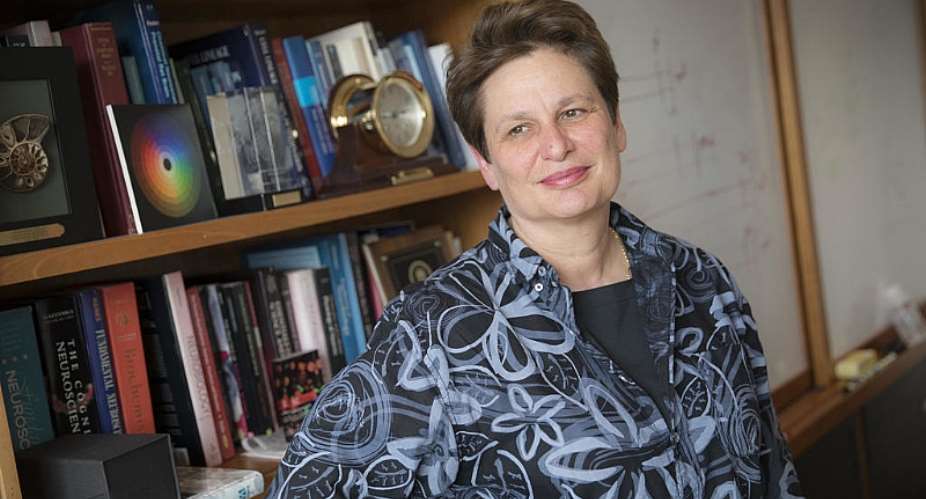French-American neurobiologist Catherine Dulac has won the Breakthrough Prize, an award created by Silicon Valley entrepreneurs, for discovering where parental instinct lies in the mouse brain.
French-born neurobiologist Catherine Dulac was recognised for her work uncovering the neural circuitry in the mouse brain responsible for the instinct, laying the foundation for further investigation into other mammals like humans.
The Harvard professor was one of seven scientists from the life sciences, mathematics and fundamental physics to receive the 2021 Breakthrough Prize, founded by Silicon Valley luminaries to recognize groundbreaking discoveries.
Each winner receives €2.5 million – three times the amount given by the Nobel Committee.
Dulac, who also works at the Howard Hughes Medical Institute, was investigating why female mice instinctively nurture mice pups, while male mice tend to attack them, depending on the circumstances.
What Dulac showed was that the neural circuits responsible for these behaviours are present in both sexes. Hormonal changes can flip the switch -- but in either direction.
That's why previously infanticidal males lovingly tend to their offspring when they become fathers, or why, under the right stressors, a mother mouse can kill her own children.
"We think what we have found can extend to other species," said Dulac, explaining that humans may also be included.
"This is an instinct. Instinct is a function of these neurons, which are, I bet, in the brains of all mammals and tell the animal, when they are in the presence of newborns, 'You have to take care of them,'" added the scientist.
The 57-year-old, who moved to the US from France 25 years ago, was keen to emphasise her work is specific to mice.
However, it is also fundamental research and therefore is of obvious interest for people working on transgender issues since, as the professor says, "male" and "female" wiring exists in all mammals.
Families and allies of transgender people have often reached out to her to thank her: "I'm a scientist, I look at data, I'm neutral." But she admits, "It really touches me. That's when I say, 'I've been useful.'"
As for the prize money, she said that she will give part of it to causes related to the health and education of women and disadvantaged populations.
France behind in equality
Originally from Montpellier in the south of France, Dulac studied at the Ecole Normale Supérieure in Paris, completing her doctorate before leaving for the US.
She had originally intended to return. "But my post-doc had gone very well, and I had the opportunity to have my own lab in the US. I wouldn't have had my own lab in France.
"There, I would have faced a really paternalistic setting, where people would say things like, 'You're much too young to have your own budget, you don't have enough experience to be independent,'" she said.
Dulac believes that, when it comes to promoting gender equality, the United States is years ahead of France. But still finds that male colleagues she meets at conferences routinely underestimate and patronise her.
"It's annoying. It's like, 'You don't expect me to have something interesting to say?'" said the professor, sighing at the tendency in academia that could perhaps come down to "male" and "female" wiring.
(with AFP)





 2024 elections: Resign if you can't be faithful to party - Sagnarigu NDC PC desc...
2024 elections: Resign if you can't be faithful to party - Sagnarigu NDC PC desc...
 Five arrested, remanded over alleged murder of two police officers at Transacco
Five arrested, remanded over alleged murder of two police officers at Transacco
 Tax exemptions better than incentives for churches – Tax Analyst tell Bawumia
Tax exemptions better than incentives for churches – Tax Analyst tell Bawumia
 Transport Minister sues Law Platform Editor for defamation
Transport Minister sues Law Platform Editor for defamation
 Voter registration: Police arrest NPP Treasurer for Mpohor for registering minor
Voter registration: Police arrest NPP Treasurer for Mpohor for registering minor
 "This nonsense must stop" — Lawrence Tetteh vows to march to Jubilee House over ...
"This nonsense must stop" — Lawrence Tetteh vows to march to Jubilee House over ...
 2024 elections: “If indeed you stand for peaceful elections the time is now for ...
2024 elections: “If indeed you stand for peaceful elections the time is now for ...
 I have the attributes to be president of this country — Bernard Monarh
I have the attributes to be president of this country — Bernard Monarh
 Cecilia Dapaah saga: ‘Turf war’ between AG, EOCO, OSP indicates they’re not ‘cor...
Cecilia Dapaah saga: ‘Turf war’ between AG, EOCO, OSP indicates they’re not ‘cor...
 Ghana will become the first African country to embrace blockchain-powered gover...
Ghana will become the first African country to embrace blockchain-powered gover...
